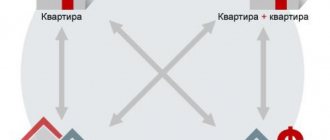Until the early 1990s, the entire housing stock in the Russian Federation belonged to the state, and residents were tenants of real estate on the basis of a social tenancy agreement. Russians received the right to re-register their housing as personal property only in 1992, when a free privatization program was adopted.
However, it is important for every owner to remember that in exceptional cases the reverse process is also possible, during which the privatized apartment is alienated in favor of the state.
When is there a risk of losing a privatized apartment?
The owner of a privatized apartment has not only rights, but also responsibilities . In particular, he must pay utilities and pay for the maintenance of living space. As long as payments are made regularly, the apartment owner retains the right to inviolability of housing. But if the amount of debt for rent is impressive, a court decision may be made to return the property to the state fund.
In addition, the basis for such a decision may be large alimony arrears, identified facts of illegal redevelopment and other reasons.
Who can be evicted
Both the owner and the tenant of social housing can be evicted without providing new housing. However, it is quite difficult to evict the owner. So, the following citizens can be evicted and not provided with a new apartment:
- former spouses (if the apartment or part thereof does not belong to them by right of ownership);
- persons leading an immoral and antisocial lifestyle;
- debtors;
- former owners of the apartment;
- persons using housing for other purposes;
- deprived of parental rights;
- other categories of citizens.
Debts on alimony and housing and communal services
A simple delay in the payment of alimony arising due to extenuating circumstances will never become a basis for the alienation of a privatized apartment. But if the property owner is a persistent defaulter, this may result in the apartment being put up for sale. However, the court will first seize the living space and prohibit any transactions related to real estate.
Also, large debts for paying for housing and communal services can lead to eviction from an apartment .
Utility services have every reason to go to court and demand forced collection of debts. If the court is on the plaintiff's side, the apartment will be sold at auction, and the proceeds will be used to pay off the debt. Important! Deprivation of the right to real estate is a last resort and is applied only in cases where the amount of arrears for alimony or housing and communal services payments reaches particularly large sizes and becomes equal to the cost of the apartment itself.
Eviction from public housing
Responsibilities for paying utility bills for citizens living in an apartment on the basis of a social tenancy agreement are no different from owners who have privatized their housing.
Rather, it’s the other way around: when debt arises, residents of non-privatized real estate find themselves in a less advantageous position.
According to Article 90 of the Housing Code of the Russian Federation, debts for paying housing and communal services that have accumulated over six months are already grounds for eviction of residents from an apartment owned by the state. In this case, the best the debtor can count on is a room in a dormitory.
Exceptions can be made if there are good reasons: for example, the tenant was temporarily disabled or was fired or laid off. Also, the following cannot be evicted from a municipal apartment:
- persons with disabilities;
- incapacitated citizens who are on state support.
If there are minor children
The Russian state pays special attention to the rights of children and adolescents under 18 years of age. Therefore, eviction of minor citizens for debts is extremely difficult .
When a child is the owner of privatized real estate, it will be possible to discharge him from the apartment only after permission from the guardianship authorities. In return, the minor must receive equivalent housing.
Important! A citizen under 18 years of age cannot be forcibly evicted from municipal housing either. This procedure can only be possible with the written permission of the parents.
In what cases can they be evicted from a municipal apartment?
In order to answer the question of why someone can be evicted from a municipal apartment, it is necessary to understand what grounds are provided by the legislator.
These reasons include:
- the presence of debt for an apartment that arose for at least 6 months;
- immoral behavior of the tenant (drunkenness, noise at night, etc.);
- keeping the home in poor condition;
- deliberate destruction of an apartment or its parts;
- use of the home for other than its intended purpose (warehouse, store, office, etc.);
- recognition of the house as unsafe and subject to demolition;
- the person has lost the right to use residential premises;
- seizure of the land on which the building is located in favor of the state.
Since deprivation of a person’s housing is a very serious issue, the court approaches the consideration of each specific case individually.
Example. Viktorova A.N. with her husband N.K. Viktorov in an apartment that was provided to the latter on social rental terms by local authorities. Viktorova A.N. I registered in this housing with the consent of my husband and the municipality. After the divorce, the wife refused to leave the apartment, citing the lack of another place to live. Viktorov N.K. appealed to the owner of the property (local authorities) and demanded the eviction of his ex-wife. Representatives of the municipality drew up a statement of claim to recognize Viktorova A.N. lost the right of residence. The claim, among other documents, included a certificate of divorce. Based on this, the court fully satisfied the owner’s demands and ordered the removal of A.N. Viktorova. deregister. The ex-wife left N.K. Viktorov’s apartment because she did not want the eviction procedure with the participation of bailiffs.
Other reasons
The reason for eviction from a privatized apartment can be not only debts, but also illegal actions carried out by the owner of the property. In exceptional cases, housing may be seized by the state even if all utility bills are paid on time .
Illegal redevelopment
Quite often, trying to optimize the space of an apartment, residents carry out redevelopment. If it is carried out without prior approval from the housing inspection and in gross violation of acceptable standards, the identified consequences of these actions can bring many problems to the owner. When redevelopment significantly increases the load on the load-bearing supports of the building and causes harm to other residents of the building, supervisory authorities may go to court.
By decision of the court, the owner will be fined and will also be required to return the apartment to its previous appearance. If the property owner refuses to comply with the order, he may be deprived of his right to own the home. After the sale of the property at auction, the owner will be returned part of the funds minus the amount spent on legal costs.
Confiscation of property
An apartment can be taken away as a confiscation of property if the owner has been prosecuted. In particular, this situation arises when the buyer purchases housing from the seller that was obtained by criminal means.
It is difficult to determine the buyer’s level of awareness of the seller’s criminal actions, therefore, when carrying out an illegal purchase and sale transaction, the risk of further confiscation of real estate is always present.
Deal of an antisocial nature
Any transaction with housing that violates the principles of morality and law and order accepted in society may become the basis for subsequent seizure of real estate based on a court order.
For example, you can lose your living space if it was received in the form of a bribe or if the transaction became part of a scheme for laundering illegally obtained funds.
Deprivation of property for the needs of the state
If the land on which an apartment building is built is, for some reason, required for government needs, residents may also be evicted from the privatized apartment. Each owner of the living space will be paid monetary compensation, the amount of which is determined by local authorities.
How to evict a person from public housing?
So, if for some of the reasons given in this article it is necessary to evict a person from a municipal apartment, and he does not agree to this, then the only way out is to contact the justice authorities.
Algorithm
In order to evict a person from an apartment provided by the municipality, regardless of whether he is registered in it or not, it is necessary to perform the following actions in a certain sequence:
| No. | Procedure | A comment |
| 1 | Notification | Send the resident (and, if necessary, his family members) a requirement to vacate the living space, indicating a specific deadline for compliance. Even if the housing is not vacated voluntarily, this will be evidence in court that there were attempts to resolve the matter peacefully. |
| 2 | Collection of evidence | This can be either documentary evidence of the plaintiff’s innocence or testimony of witnesses. In each specific case, the list of required documents is individual; it is necessary to proceed from the circumstances and reasons for eviction, the identity of the tenant, etc. |
| 3 | Filing a claim | The statement of claim is drawn up in accordance with the norms of the Code of Civil Procedure of the Russian Federation. |
| 4 | Payment of state duty | This is a prerequisite for filing an eviction claim. |
| 5 | Submitting a claim to court | All necessary documents and the application are transferred to the court office. This can be done in person, entrusted to a representative, or sent by mail. |
| 6 | Participation in the proceedings | This point means being present at court hearings, speaking in them, and defending your demands. |
| 7 | Getting a solution | |
| 8 | Appealing the decision | If the court makes a verdict that does not satisfy either party, the legislator gives the right to appeal it to a higher court |
| 9 | Eviction | The court decision can be executed by the defendant voluntarily or with the involvement of the bailiff service |
How the process works
The process of resolving the issue of eviction from a municipal apartment begins with filing an application. Territorial jurisdiction is determined according to the general rule - the claim is filed at the place of residence of the defendant.
Most often, a representative of the municipality participates in such a process, so it is necessary to have a power of attorney for his participation in the court hearing.
Statement of claim
A statement of claim is the main document required to initiate the process of eviction of a person from an apartment through the court. It must be drawn up in accordance with all legal requirements.
It should contain the following information:
- full name of the judicial authority;
- personal and contact details of the plaintiff (name of organization, legal address, etc.);
- information about the representative (if he participates in the case);
- personal and contact information of the defendant;
- the exact address of the location of the disputed housing;
- indication of documents of ownership;
- grounds for the defendant's use of the apartment
- reasons for eviction;
- the procedure and period of eviction desired by the plaintiff;
- justification of requirements with references to regulations and supporting documents;
- list of documents attached to the application, list of witnesses;
- date, signature and seal of the organization.
It is necessary to draw up a claim in a business style, avoiding excessive emotionality and subjective evaluative characteristics.
Documentation
Despite the fact that the documents attached to the claim are individual in each specific case, there are also those without which the claim simply will not be accepted by the judge.
Such papers include:
- claim in the required number of copies;
- a copy of the identity card of the plaintiff and (or) his representative;
- charter of a legal entity and other documents confirming its status;
- power of attorney to represent interests;
- documents on ownership of the disputed apartment;
- rental agreement;
- certificates confirming the requirements for eviction;
- receipt of state duty;
- other documents.
Other documents may include birth certificates of children, marriage or divorce, certificates from government agencies (police, housing inspection, etc.). It all depends on the specific situation and the requirements put forward by the plaintiff.
Cost and terms
Since such claims are classified by the legislator as property claims, but not subject to material assessment, the amount of the state duty when filing a lawsuit is 300 rubles.
In order to make a decision on the case, the court may take a period of several weeks to several months. It all depends on the positions of the parties, their consent or not, the presence of all the necessary documents in the case, the appearance of the participants in court proceedings and other conditions.
The eviction itself occurs after the court verdict. However, it is worth remembering that the court can delay the eviction for up to 1 year so that the defendant can find another place to live.
Loan debt
Problems with loan repayments are relevant for many borrowers. When a property owner does not make mandatory payments for a long time, the financial institution that provided the loan has the right to go to court .
However, they will be able to take the apartment to pay off the debt if:
- the debt has reached particularly large proportions;
- the property is not the only home for the borrower and his family members.
According to paragraph 1 of Art. 446 of the Code of Civil Procedure of the Russian Federation, the exception is the case when the apartment was purchased with a mortgage and was pledged to the bank , which was the actual owner of the property. Then the financial organization has the right to go to court and demand repayment of the debt through the forced sale of the collateral housing.
Who does the law classify as former family members?
Within the meaning of parts 1 and 4 of Article 31 of the Housing Code of the Russian Federation, former family members of the owner of a residential premises include persons with whom the owner’s family relations have been terminated. The termination of family relations between spouses should be understood as the dissolution of a marriage in the civil registry office, in court, or the recognition of a marriage as invalid. Refusal of other persons to maintain a common household with the owner of the residential premises, lack of a common budget or common household items with the owner, failure to provide mutual support to each other, etc., as well as departure to another place of residence may indicate the termination of family relations with the owner living space.
The issue of recognizing a person as a former family member of the owner of a residential premises in the event of a dispute is decided by the court, taking into account the specific circumstances of each case.
Benefit
Sometimes eviction from an apartment can be beneficial for the owner . In particular, this is possible when it comes to relocating emergency housing.
According to Russian legislation, the state must provide owners of apartments in a dilapidated building with other housing or pay financial compensation, which should be enough to purchase a new living space.
Even if the apartment is not municipal, but is privately owned by the owner, the state has the right to take away the living space from its owner. To avoid such a fate, the owner must be responsible in paying for housing and communal services, as well as repaying other debts (for example, loans or alimony). If a citizen does not violate the laws of the Russian Federation, his right to real estate will remain inviolable.
Rights of defendants in court-ordered evictions
The defendant can count on being granted a deferment on eviction in accordance with Article 434 of the Civil Procedure Code of the Russian Federation. To do this, the person evicted by court decision can submit an application to the bailiffs requesting such a deferment. The legislation provides for a certain range of reasons for deferring forced eviction:
- difficult financial situation (Article 203 of the Civil Procedure Code of the Russian Federation);
- eviction of a tenant with a minor child;
- the defendant has a serious illness that requires constant care and relocation may aggravate the health condition;
- reconciliation of the parties, when the defendant was able to come to an agreement with the plaintiff (for example, compensated for property damage or paid part of the rent debt).
To verify these reasons, you will need salary statements, receipts, birth certificates for minors, medical certificates, prescriptions and receipts for medications.
Where to start, where to turn?
You need to start by collecting the so-called evidence base .
It is necessary to document the facts on the basis of which the tenant should be evicted from the apartment he occupies.
One complaint is not enough to make such a serious decision as depriving a person of a place to live.
First you need to contact the landlord:
- to the city government;
- to the municipality;
- to the municipal administration;
- to the structure that provides specific residential premises for social rent.
The landlord must take action against the lawbreaker and respond to the applicant within thirty days.
If the measures taken by him did not have the desired effect and the employer continues to violate the law, he will have to go to court.
Initiators
Only a court has the right to forcibly deprive a citizen of the right to reside
What is the procedure regulated by? In its actions, the court relies on the provisions of Article 91 of the Housing Code of the Russian Federation.
Who can file an eviction? The initiators of legal claims may be:
- neighbours;
- municipality;
- state housing inspection.
Find out on our website also how to evict illegal residents, whom the owner has the right to evict from his apartment, and also whether the owner himself can be evicted for violating the rights of his neighbors.
Timing and cost
When filing a claim in court, payment of a state fee is required. In 2021, the state fee for a claim for expulsion from social housing is 300 rubles .
If the plaintiff wishes to use the services of a lawyer, then the cost of filing a claim and protecting his interests will depend on the individual prices of the specialist. Completely conducting a case without the participation of the plaintiff can cost several tens of thousands of rubles.
How long will it take? Practice shows that the expulsion of a tenant from municipal housing is a very long process and will take at least seven months:
- Reception and consideration of the case in court - two months (Article 154 of the Code of Civil Procedure of the Russian Federation).
- The issuance of a court decision and consideration of a cassation appeal takes two months (Articles 119 and 348 of the Code of Civil Procedure of the Russian Federation).
- Return of the case from the cassation instance and issuance of a writ of execution – one month (Article 428 of the Code of Civil Procedure of the Russian Federation).
- Enforcement proceedings in the case by bailiffs, expulsion of a citizen - two months (Article 36-FZ of October 2, 2007 No. 229-FZ “On Enforcement Proceedings”).
And this is with the “ideal” passage of the case through the authorities.
In practice, consideration of the issue may be delayed and the consideration of the case is constantly postponed to a later date due to insufficient evidence, requests for new papers, failure of the defendant to appear, appeal of the court decision, etc.
Arbitrage practice
The judicial practice of the Russian Federation shows that most decisions are made in favor of the owner of the premises. Depending on the verdict, the tenant must vacate the premises within a certain time.
However, he has the right to file an appeal. For compelling reasons, the court may grant an installment plan, but it rarely exceeds 2-3 months.
What fee do I need to pay?
When filing a claim, you must pay a state fee. Its size is 300 rubles for each demand made.
How to file an application for deferment of eviction?
The application is made in writing, in any form. In this case, it is necessary to indicate the following data: name of the organization or individual entrepreneur, information about the tenant, information about the premises, grounds for invalidating the verdict.
The application is considered within 14 days, after which a decision is made.
Refusal to consider
The case may be refused. When accepting the statement of claim and the documents attached to it, the judge determines whether all documents required by law have been provided .
If he identifies significant deficiencies in the statement of claim itself or in the attached documents, he may temporarily leave it without movement and set a deadline for making corrections.
If the comments are not corrected within this period, the judge has the right to refuse registration and return without consideration.
But this does not mean that the case is completely lost - the identified comments can be taken into account, eliminated and the claim can be filed again.
Submission of documents
Each case is individual and the list of documents depends on the reason for which the plaintiff demands to expel the tenant from municipal housing:
- Impossibility of living together - at least two statements to the police are required with answers about the measures taken against the violator.
- Long-term absence - you will need an act indicating the time of absence from the place of residence, certified by the management company.
- Divorce - a copy of the divorce certificate or a copy of the court decision is required.
- In many cases it is necessary to resort to the support of witnesses . These could be employees of service organizations or government agencies, or neighbors. It is a common misconception that relatives cannot be witnesses - this is not true, they can also testify to the required facts.
- A social tenancy agreement confirming the legality of the plaintiff’s residence in the premises is attached to the claim in any case.
- An extract from the house register or a certificate of registered persons is also required for any claim.
Documents and a statement of claim must be submitted to the court of general jurisdiction at the place of residence.
You can file a claim yourself, guided by Articles 131 and 132 of the Code of Civil Procedure of the Russian Federation, but it is better to contact a qualified lawyer.
Correctly, without unnecessary emotions, a statement drawn up , supported by the necessary evidence, increases the likelihood of a positive consideration of the case by the court.
Where will the former tenant go?
Eviction can be carried out:
- without providing any place of residence;
- with the provision of a place of residence without amenities;
- with the provision of comfortable housing.
The law does not indicate the criteria by which the livability of the premises provided to replace the old one is assessed, saying only that the premises must be suitable for living with amenities “in relation to the conditions of the locality.”
Thus, in a regional city these may be some conditions, but in a rural settlement they may be different, much less favorable.








